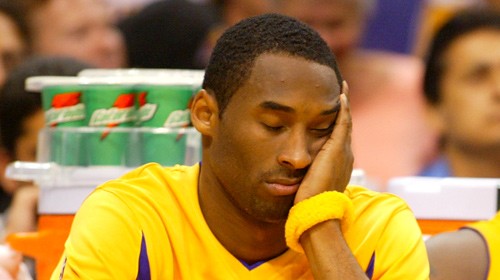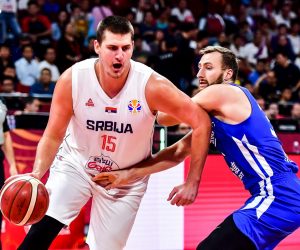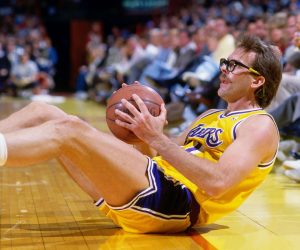The NBA season has barely started, and some of the game’s biggest stars are already pretty tired. That’s according to a recent ESPN report that says a number of NBA players — notably those based on the West Coast — suffer from sleep deprivation. Calling it the “dirty little secret everybody knows about,” ESPN reports the issue can lead to long-term consequences, including increased levels of injury, long-term health issues, and more immediately, lost games.

The reasons for player sleep deprivation are obvious. In a given season, the average player flies anywhere between 1,800 and 7,000 miles each week, and plays as many as three back-to-back games that can last deep into the night. Putting that in perspective, ESPN notes that, on average, NBA players travel “50,000 miles per season — roughly 20,000 more miles each season than NFL teams, and far enough to circle the globe twice.”
Over the course of an 82-game regular season, and perhaps, another dozen or so playoff games, the fatigue adds up, and players break down.
NBA Schedule Shifts to Minimize Sleep Deprivation
The league has taken some steps to lessen sleep deprivation for the players, coaches and traveling staff. Over the last five seasons, back-to-back games have been reduced. Scheduling four games in five days is a thing of the past. This year, the league even started the season a week early to add seven more days off.
But, the realities of playing so many games in so short at period of time means players will inevitably struggle to reach optimal levels of sleep. You can’t get seven or eight hours of rest when you aren’t even in your hotel room for six hours.
Philadelphia 76ers forward Tobias Harris has taken up the more-sleep soapbox. He told ESPN that despite the ribbing he receives from teammates over his “bedtime,” he believes, “In a couple years [sleep deprivation] will be an issue that’s talked about, like the NFL with concussions.”
For most people, not just athletes, naps aren’t enough to counteract to the effects of sleep deprivation — you need to sleep long stretches of at least seven hours to reap the benefits of quality rest we all need every day.
Playing a game which drenches the body in cortisol to stay alert and awake, and then trying to sleep in a hotel or on a plane is insane. Cortisol has the exact opposite effect in the body of the brain chemistry needed to fall asleep. Normally, an individual engaged in a strenuous activity like high-level sports should have two or three hours of down time before attempting to fall asleep. A plane trip or a bus ride with dozens of others players and staff does not provide that needed down time.
To be clear, studies show that the problem is not too many games or playing too many minutes. The issue is too much travel across too many time zones over the course of an 82-game schedule.
West Coast Teams at Bigger Disadvantage?
The East-to-West trips are not as harmful to sleep patterns as the West to East journeys.
The human body holds to a circadian rhythm based on the seasons and the rising sun. Scientists have known for years that shift workers experience sleep problems when trying to adjust a sleep pattern to a cycle that doesn’t sync with the rising and setting sun. Travel across time zones only adds to these problems.
“There’s not a factory on the planet that would move shift workers the way we move NBA players,” Timothy Royer told ESPN. Royer is clinical neuropsychologist with Neuropeak Pro, a controversial company that specializes in brain performance and athletic recovery. He spent three years with the Orlando Magic, where he observed the rigors of their schedule and began developing his theories about sleep deprivation in the NBA.
Imagine playing a Sunday evening game in San Francisco. Monday is an off day and a travel day to New York for a Tuesday game. The full day off to travel is a good start, however, the math doesn’t work for the west-to-east players. The plane leaves SF on Monday at noon and arrives in NY four hours later not at 4 pm, but at 7 pm East Coast time. The players’ body clocks say it is afternoon, the NY clocks say evening. So when the players are ready to sleep is it 10 pm or 7 pm?
You can’t make up for jet lag by sleeping more or waking up at the correct East Coast time. The body needs time to adjust. But the Tuesday game in NY is followed by Thursday in Detroit, and Saturday night in Denver.
The problem isn’t as severe when traveling east to west. Studies have shown we all experience less circadian disruption when we travel east to west. So for the players on West Coast teams, they have more sleep disruption issues to cope with during the season than do East Coast players. And yes, players in the Central and Mountain time zones have even fewer adjustments, as their road trips are easier to schedule and they don’t travel through as many time zones than do their counterparts on in the east and west.
Health Effects of Sleep Deprivation
Even for some of the world’s top athletes, the ramifications of sleep deprivation can pose serious health concerns and create long-lasting problems. Some of the most common side effects of sleep deprivation include:
- Memory Issues – particularly short-term memory; like who you’re guarding or what play is being run
- Concentration – focus and serial processing are early losses to a sleep-deprived player
- Accidents – injuries have been shown to rise in the workplace because of lack of sleep
- Weight Gain – the body craves energy lost to lack of sleep; sugar is an immediate source of energy and eventually weight gain
- Balance & Coordination – critical to athletic performance, these physical effects can arise after a single night of lost sleep
- Lowered Testosterone Level – testosterone is critical to muscle building and strength maintenance. Studies have shown that lowered levels of testosterone lead to increased injuries in the work place.
Recent studies have followed NBA players for a full season and found that, on average, their levels of testosterone fall as the season wears on. For some players the numbers reach levels that would require supplemental medication if they were being treated by a physician.











